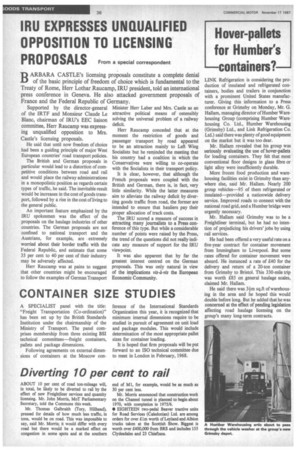IRU EXPRESSES UNQUALIFIED OPPOSITION TO LICENSING
Page 38

If you've noticed an error in this article please click here to report it so we can fix it.
PROPOSALS From a special correspondent BARBARA CASTLE's licensing proposals constitute a complete denial of the basic principle of freedom of choice which is fundamental to the Treaty of Rome, Herr Lothar.Raucamp, IRU president, told an international press conference in Geneva. He also attacked government proposals of France and the Federal Republic of Germany.
Supported by the director-general of the IRTF and Monsieur Claude Le Blanc, chairman of IRLT's EEC liaison committee, Herr Raucamp was expressing unqualified opposition to Mrs. Castle's licensing proposals.
He said that until now freedom of choice had been a guiding principle of major West European countries' road transport policies.
The British and German proposals in particular would lead to a distortion of competitive conditions between road and rail and would place the railway administrations in a monopolistic position as regards certain types of traffic, he said. The inevitable result would be increases in the cost of goods transport, followed by a rise in the cost of living to the general public.
An important feature emphasized by the IRU spokesmen was the effect of the proposals on the haulage industries of other countries. The German proposals are not confined to national transport and the Austrians, for example, are extremely worried about their border traffic with the Federal Republic, and estimate that some 35 per cent to 40 per cent of their industry may be adversely affected.
Herr Raucamp was at pains to suggest that other countries might be encouraged to follow the examples of German Transport Minister Herr Laber and Mrs. Castle as an attractive political means of ostensibly solving the universal problem of a railway deficit.
Herr Raucamp conceded that at the moment the restriction of goods and passenger transport by road appeared to be an attraction mainly to Left Wing Socialists but he reminded the meeting that his country had a coalition in which the Conservatives were willing to co-operate with the Socialists in their transport policy.
It is clear, however, that although the French proposals were coupled with the British and German, there is, in fact, very Little similarity. While the latter measures aim to alleviate the railway deficit by diverting goods traffic from road, the former are intended to ensure that hauliers pay their proper allocation of track costs.
The IRU scored a measure of success in attracting many journalists to a Press conference of' this type. But while a considerable number of points were raised by the Press, the trend of the questions did not really indicate any measure of support for the IRU viewpoint.
It was also apparent that by far the greatest interest centred on the German proposals. This was only natural in view of the implications vis-a-vis the European Economic Community.
















































































































































